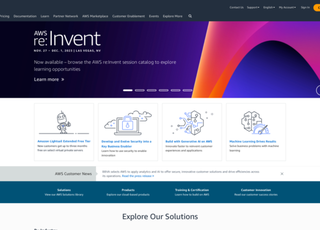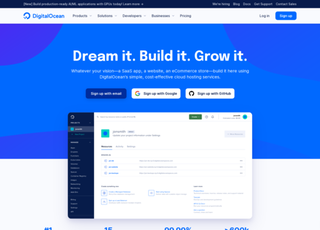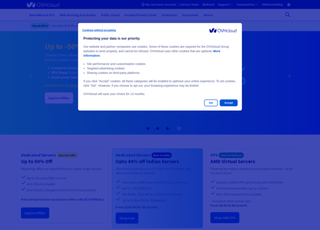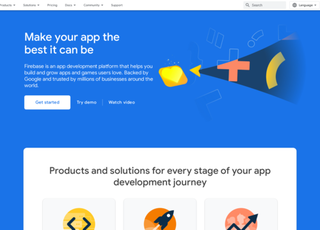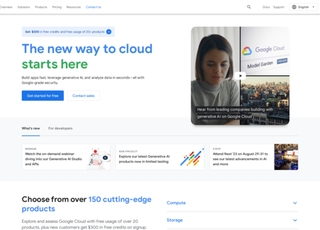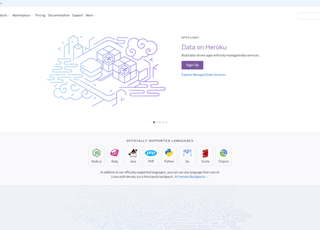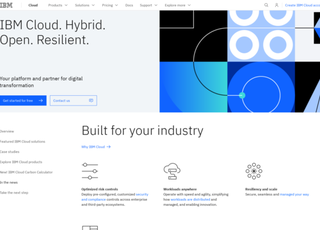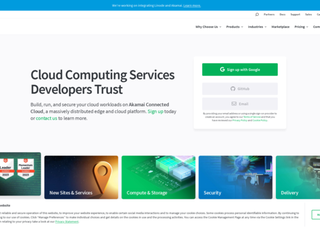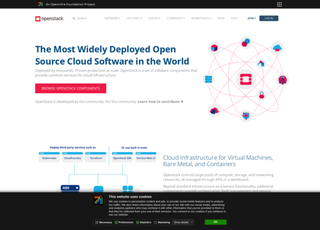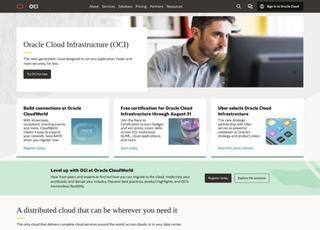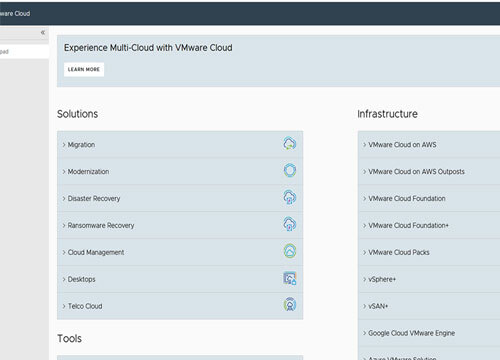Microsoft Azure
https://azure.microsoft.com/en-usMicrosoft Azure
Microsoft Azure, often simply referred to as Azure, is an extensive cloud computing service created by Microsoft. It offers a wide range of cloud services, including those for computing, analytics, storage, and networking. Users can pick and choose from these services to develop and scale new applications, or run existing applications in the public cloud.
The platform is built on a global network of Microsoft-managed data centers, providing a wide range of services in various categories:
Compute
The compute services in Microsoft Azure form a core component of its offerings, enabling users to run applications and workloads in the cloud with flexibility and efficiency. Here's a detailed look at some of the key compute services available in Azure:
Azure Virtual Machines (VMs)
These are scalable on-demand, pay-as-you-go virtual machines that can be used for a wide range of computing solutions. They are highly customizable, allowing users to choose from a variety of machine sizes, operating systems (including both Windows and Linux), and configurations. VMs are ideal for hosting applications, websites, and databases, and they can be scaled up or down as needed.
Azure Kubernetes Service (AKS)
This managed container orchestration service is based on Kubernetes, an open-source system. AKS simplifies deploying, managing, and scaling containerized applications using Kubernetes. It automates various tasks such as load balancing, health monitoring, and networking, allowing developers to focus more on application development rather than infrastructure management.
Azure Functions
This is a serverless computing service that enables users to run event-triggered code without explicitly provisioning or managing infrastructure. It supports multiple programming languages and integrates with other Azure services. Azure Functions is ideal for building microservices and workflows that react to events in almost real-time, such as changes in data, updates from IoT devices, or messages from other cloud services.
Azure App Service
A fully managed platform for building, deploying, and scaling web apps. It supports a range of programming languages like C#, Java, Ruby, Node.js, PHP, and Python. Azure App Service provides auto-scaling, integrated security, and support for continuous integration and deployment (CI/CD) workflows.
Azure Batch
This service is designed for large-scale parallel and high-performance computing (HPC) applications. Azure Batch enables the efficient running of large-scale batch processing jobs across a managed collection of virtual machines. It's often used in scenarios where tasks need to be executed in bulk, such as rendering, financial risk modeling, and engineering simulations.
Azure Virtual Machine Scale Sets (VMSS)
VMSS allows the creation and management of a group of load-balanced VMs. The number of VM instances can automatically increase or decrease in response to demand or a defined schedule, making it suitable for applications that need to handle variable loads.
Azure Dedicated Host
This service provides physical servers dedicated to your organization. It offers more control over the server infrastructure, including the choice of processor type, configuration, and host maintenance policies. It's useful for workloads that require a high degree of isolation for compliance or regulatory reasons.
Azure Container Instances (ACI)
ACI offers the fastest and simplest way to run a container in Azure without having to manage any virtual machines or adopting a higher-level service. It's ideal for tasks that can be completed quickly and don't require advanced orchestration, such as simple applications, task automation, and build jobs.
These compute services in Azure offer a range of solutions to meet various computing needs, from simple applications and data processing tasks to complex, high-performance computing workloads. They provide the flexibility to choose the right level of control, management, and scalability based on the specific requirements of each application or workload.
Networking
Microsoft Azure's networking services are a critical part of its cloud offering, enabling the setup, management, and optimization of network connectivity within and outside of the Azure environment. Here's a detailed look at some of the key networking services available in Azure:
Azure Virtual Network (VNet)
This foundational service allows you to create your own private network in the cloud. It's similar to a traditional network that you'd operate in your own data center but with the added benefits of Azure's infrastructure. With VNet, you can segment the network, use private IP addresses, and connect VNets together. It also supports the creation of subnets, access control policies, and routing.
Azure ExpressRoute
This service provides a private connection between Azure data centers and your on-premises infrastructure or colocation environment. ExpressRoute connections don't go over the public internet, offering more reliability, faster speeds, lower latencies, and higher security than typical connections.
Azure Load Balancer
This is a Layer 4 (TCP, UDP) load balancer that provides high availability and network performance to your applications. It can distribute incoming traffic among healthy instances of services defined in a load-balanced set. Azure Load Balancer can be used for both internet-facing and private network traffic.
Azure Application Gateway
A web traffic load balancer that enables you to manage traffic to your web applications. This Layer 7 load balancer offers features like SSL termination, cookie-based session affinity, and URL-based routing. It's particularly useful for managing traffic to complex web application deployments.
Azure VPN Gateway
It connects your on-premises networks to Azure through Site-to-Site VPNs, much like you'd set up and connect to a remote branch office. The connection is secure and uses the industry-standard protocols Internet Protocol Security (IPsec) and Internet Key Exchange (IKE).
Azure Traffic Manager
This DNS-based traffic load balancer enables you to distribute traffic optimally to services across global Azure regions while providing high availability and responsiveness. It's particularly effective for ensuring your users have the fastest possible access to your services.
Azure DNS
Azure DNS provides ultra-fast DNS responses and global redundancy. It allows you to host your DNS domain in Azure, managing your DNS records using the same credentials, APIs, tools, and billing as your other Azure services.
Azure Content Delivery Network (CDN)
This service delivers high-bandwidth content to users around the world with low latency and high availability. The CDN offers a way to cache content in multiple locations for faster delivery to users regardless of their location.
Azure Front Door Service
It offers a scalable and secure entry point for fast delivery of your global web applications. Azure Front Door enhances service performance and reliability with instant global failover.
Azure Network Watcher
This service provides tools to monitor, diagnose, view metrics, and enable or disable logs for resources in an Azure virtual network.
Azure Firewall
A managed, cloud-based network security service that protects your Azure Virtual Network resources. It's a fully stateful firewall as a service with built-in high availability and unrestricted cloud scalability.
Azure Bastion
Provides secure and seamless RDP/SSH connectivity to your virtual machines directly in the Azure portal over SSL. It eliminates the need for public IP addresses on your VMs, reducing exposure to potential attacks.
These networking services collectively enable robust, scalable, and secure network infrastructure in the Azure cloud. They offer the flexibility and control needed to customize network configurations and integrate with both Azure and on-premises resources, ensuring efficient and secure connectivity for a variety of applications and workloads.
Storage
Microsoft Azure offers a diverse range of storage services, catering to different data storage and management needs. These services are designed to be highly available, secure, and scalable. Here's a detailed overview of Azure's key storage services:
Azure Blob Storage
This is Azure's object storage solution for the cloud. Blob storage is optimized for storing massive amounts of unstructured data, such as text or binary data. It's widely used for serving images or documents directly to a browser, storing files for distributed access, streaming video and audio, and storing data for backup, disaster recovery, and archiving.
Azure File Storage
Azure Files offers fully managed file shares in the cloud that are accessible via the industry-standard Server Message Block (SMB) protocol. This service can be used to replace or supplement on-premises file servers or NAS (network attached storage) devices. Azure Files enable sharing files between applications running in your VMs using familiar Windows APIs or Azure Files REST API.
Azure Queue Storage
This service is used for storing large numbers of messages that can be accessed from anywhere in the world via authenticated calls using HTTP or HTTPS. A single queue message can be up to 64 KB in size, and a queue can contain millions of messages, up to the total capacity limit of a storage account. Queue Storage is often used to create a backlog of work to process asynchronously.
Azure Table Storage
Azure Table Storage stores large amounts of structured, non-relational data. It's a NoSQL data store for rapid development using massive semi-structured datasets. This service is ideal for storing flexible datasets like user data for web applications, address books, device information, and other metadata.
Azure Disk Storage
This service provides high-performance, durable block storage for Azure Virtual Machines (VMs). You can choose from a range of disk sizes and performance levels to meet the needs of your applications. It's the right choice for VMs running I/O-intensive workloads, databases, and other applications that need persistent, secure disk storage.
Azure Data Lake Storage
This is a highly scalable and secure data lake for big data analytics. Data Lake Storage combines the power of a high-performance file system with massive scale and economy to help you speed your time to insight. Data Lake Storage is built for high-performance analytics and is compatible with Hadoop Distributed File System (HDFS), and it works with the Apache Hadoop ecosystem.
Azure Backup
A straightforward but critical service that offers a simple, secure, and cost-effective solution to back up your data and protect it from ransomware and human errors. It supports Azure virtual machines, SQL workloads, and on-premises VMware machines.
Azure Archive Storage
Azure offers a cost-effective, durable, and highly available storage solution for rarely accessed data with flexible latency requirements (typically hours). This is suitable for long-term backup, secondary backup, and archival datasets.
Azure Managed Disks
Azure Managed Disks simplifies disk management for Azure IaaS VMs by managing the storage accounts associated with the VM disks. You only have to specify the size of the disk and the data residency, and Azure creates and manages the disk for you.
Each of these services is designed to offer a tailored solution to different aspects of cloud storage, whether it's large-scale data lakes for analytics, simple blob storage for unstructured data, reliable queue systems for communication between applications, or secure disk storage for virtual machines. Azure's storage services are integrated with a wide range of Azure's compute and networking services, providing a comprehensive and cohesive infrastructure solution in the cloud.
Mobile and Web Applications
Microsoft Azure provides a robust and versatile platform for hosting, developing, and managing mobile and web applications. This platform offers a variety of services that cater to different aspects of application development, from hosting and back-end services to analytics and integration. Here's a more detailed look at Azure's offerings in this area:
Azure App Service
A key service for hosting web and mobile apps, Azure App Service enables developers to quickly build, deploy, and scale enterprise-grade web, mobile, and API apps. It supports a variety of programming languages, including C#, Java, Ruby, Node.js, PHP, and Python. App Service also integrates with Azure DevOps, GitHub, and BitBucket for continuous integration and deployment (CI/CD). Features like auto-scaling, patch management, and staging environments provide added efficiency.
Azure Mobile Apps
Part of Azure App Service, this is a mobile app development platform that offers a secure backend as a service (BaaS). It provides key capabilities for mobile application development, such as user authentication, offline data sync, push notifications, and integration with social media services. It simplifies the creation of scalable and globally available mobile apps.
Azure API Apps
Also within Azure App Service, this service simplifies building, consuming, and managing RESTful web APIs. It supports common languages and frameworks, and provides features like Swagger-based API discovery, versioning, and hosting. API Apps make it easier to develop, host, and consume APIs in the cloud.
Azure Notification Hubs
This service provides a highly scalable, cross-platform, and flexible push notification infrastructure. It enables you to send push notifications to any platform (iOS, Android, Windows, etc.) from any back-end (cloud or on-premises). It's especially useful for sending personalized, targeted, and scheduled push notifications.
Azure Logic Apps
For automating workflows and business processes, Azure Logic Apps enables the creation of scalable solutions for app integration, data integration, system integration, enterprise application integration (EAI), and B2B communication. It offers a visual designer with various connectors to integrate with other Azure services, SaaS products, and on-premises systems.
Azure Active Directory B2C (Azure AD B2C)
A customer identity access management solution, Azure AD B2C allows you to add user sign-up, sign-in, and profile management to your mobile apps and web applications. It supports integration with social identity providers like Facebook, Google, Microsoft, and Twitter, and offers features for customizing the user interface and the user journey.
Azure Cosmos DB
A globally distributed, multi-model database service, Cosmos DB is commonly used as a backend database for web and mobile applications. It offers turnkey global distribution, multi-region replication, and guarantees single-digit millisecond latencies, making it suitable for applications that require a fast and highly available database service.
Azure CDN (Content Delivery Network)
This service is used to deliver high-bandwidth content, such as images, videos, and application assets, faster and more reliably to users worldwide, thereby enhancing the performance of web applications.
Azure Front Door Service
Enhances the performance and availability of your web applications with its routing and load balancing capabilities. It offers a scalable and secure entry point for delivering your global web applications.
By leveraging these services, developers can build scalable, high-performance, and secure web and mobile applications with ease. Azure's integration capabilities, global reach, and commitment to security and compliance make it a compelling choice for businesses of all sizes looking to innovate in the digital space.
Databases
Microsoft Azure provides a wide range of database services that cater to different data storage and management needs, enabling scalable, reliable, and secure data storage solutions in the cloud. Here’s a more detailed look at Azure's database services:
Azure SQL Database
A fully managed relational database service that offers SQL Server engine compatibility. Azure SQL Database is a scalable, intelligent, and secure database service built for the cloud. It supports a wide range of applications from small to large scale, offering features like automated backups, built-in intelligence, and robust security.
Azure Cosmos DB
A globally distributed, multi-model database service that enables you to elastically and independently scale throughput and storage across any number of Azure's geographic regions. It offers comprehensive SLAs and supports various data models, including document, key-value, graph, and column-family through APIs for SQL, MongoDB, Cassandra, Gremlin, and Azure Table Storage.
Azure Database for MySQL
A managed service that provides MySQL database capabilities. It offers built-in high availability, elastic scaling for performance, and industry-leading security and compliance. This service is ideal for applications that rely on open-source software and use MySQL as their database.
Azure Database for PostgreSQL
This service offers a fully managed, enterprise-ready PostgreSQL database as a service. It includes features like high availability, monitoring, and scaling, making it suitable for running open-source PostgreSQL databases without the overhead of managing the infrastructure.
Azure Database for MariaDB
A fully managed MariaDB database service. It's an ideal choice for those applications that run on MariaDB but need the scalability, high availability, and security of Azure.
Azure SQL Managed Instance
This service provides broad SQL Server engine compatibility and native virtual network (VNET) support. It's a blend of the fully managed nature of Azure SQL Database with the full compatibility of SQL Server, offering an easy migration route for on-premises SQL Server databases to the cloud.
Azure Synapse Analytics (formerly SQL Data Warehouse)
A limitless analytics service that brings together enterprise data warehousing and Big Data analytics. It offers the freedom to query data on your terms, using either serverless or provisioned resources.
Azure Cache for Redis
A fully managed in-memory data store based on the popular open-source Redis cache. It's used for caching frequently queried data, thereby improving the performance and scalability of systems that rely on backend data-stores heavily.
Azure Table Storage
A NoSQL data store for semi-structured data. Azure Table Storage is a good choice for flexible datasets—such as web app user data, address books, device information, and other metadata—and its schemaless design makes it easier to adapt your data as the needs of your application evolve.
Azure SQL Edge
Tailored for IoT and edge computing, this service brings capabilities of SQL to edge devices. It offers a small footprint, low-latency, and supports a wide range of time-series, streaming, and AI-inference data.
Azure Database Migration Service
This service simplifies, guides, and automates your database migration to Azure. It supports migrations from multiple database sources to Azure data platforms with minimal downtime.
These database services collectively provide a comprehensive set of solutions for handling a wide range of data requirements, from typical relational databases to NoSQL options, and from small-scale applications to large-scale, globally distributed applications. Azure's commitment to security, compliance, global scalability, and integration with other Azure services makes these database solutions highly effective for modern cloud applications.
Artificial Intelligence (AI) and Machine Learning
Azure includes services for AI and machine learning tasks, such as Azure Machine Learning Service and Azure Cognitive Services, which provide pre-built APIs for common AI tasks.
Internet of Things (IoT)
Azure IoT solutions offer a set of services to connect and manage IoT devices, along with services to analyze and visualize real-time data from these devices.
Development Tools
Azure DevOps provides developer tools for supporting the software development lifecycle, and Azure DevTest Labs offers testing environments.
Security and Identity Services
Azure provides robust security features, including Azure Active Directory for identity services, and Azure Sentinel for security information and event management.
Hybrid Capabilities
Azure facilitates hybrid environments that can span on-premises and the cloud, with services like Azure Stack for bringing Azure services into your data center.
Analytics and Big Data
Azure provides a suite of analytics services, including Azure Synapse Analytics for big data and complex analytics projects, and Azure HDInsight for processing huge amounts of data using open source frameworks like Hadoop and Spark.
Blockchain Services
For developing and managing blockchain applications, Azure offers Azure Blockchain Service, which simplifies the formation, management, and governance of consortium blockchain networks.
Integration Services
Azure Logic Apps and Azure Event Grid help in integrating various services and applications, both within Azure and with external systems, allowing for efficient workflow automation and event-driven computing.
Developer Tools and SDKs
Azure supports a wide range of programming languages and provides SDKs for easier integration of Azure services into your applications. This includes support for .NET, Java, Node.js, Python, and others.
Management and Governance Tools
Tools like Azure Monitor and Azure Policy provide capabilities to monitor, manage, and enforce corporate governance across Azure resources.
Disaster Recovery and Backup
Azure offers robust solutions for data backup and disaster recovery, including Azure Site Recovery and Azure Backup, ensuring business continuity and data integrity.
Migration Tools
Azure Migrate provides a centralized hub for assessment and migration of on-premises servers, applications, and data to Azure.
Mixed Reality
Azure also ventures into the realm of mixed reality with services like Azure Spatial Anchors and Azure Remote Rendering, which are used for creating immersive and interactive experiences.
The platform's ability to integrate with various Microsoft products, like Office 365 and Microsoft Dynamics, as well as its support for numerous third-party applications and services, makes it a versatile choice for many businesses.
Moreover, Azure is known for its commitment to sustainability and has been making significant strides towards becoming carbon-neutral. It uses advanced energy-efficient technologies in its data centers and invests in renewable energy sources.
Microsoft Azure stands out as a robust, scalable, and flexible cloud platform, suitable for a wide range of computing needs across industries, continually adapting to the evolving demands of modern businesses and technology trends.





















